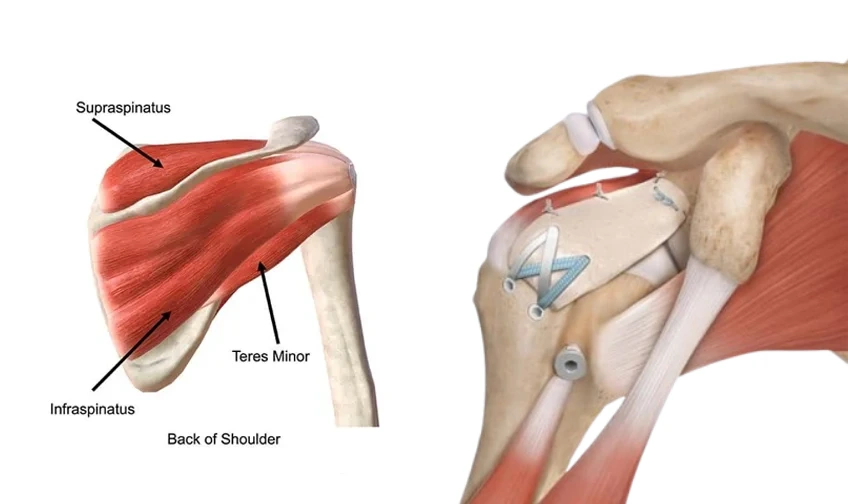Rotator Cuff Tear

A rotator cuff tear occurs when one or more of the tendons in the rotator cuff (a group of four muscles and tendons that stabilize the shoulder and assist with movement) become torn or damaged. This injury can result from acute trauma or wear and tear over time, particularly in individuals who engage in repetitive shoulder movements.
Types of Rotator Cuff Tears
- Partial Tear: The tendon is frayed or damaged but not completely severed.
- Complete Tear: The tendon is fully detached from the bone, often leaving a hole in the tendon.
Causes of a Rotator Cuff Tear
- Acute Injury: A sudden fall or lifting something too heavy with a jerking motion can cause a tear.
- Degenerative Tear: Over time, tendons can wear down due to repetitive motions, especially in people involved in sports (e.g., tennis, baseball) or jobs requiring repetitive arm motions.
- Aging: Natural wear and tear that comes with aging can weaken the tendons, increasing the risk of a tear.
Symptoms of a Rotator Cuff Tear
- Pain in the shoulder, especially when lifting or lowering the arm.
- Weakness in the shoulder, particularly during overhead activities.
- Limited Range of Motion, with difficulty reaching behind your back or raising your arm.
- Clicking or Popping Sounds in the shoulder joint.
- Night Pain: Difficulty sleeping on the affected side due to discomfort.
Diagnosis
If you suspect a rotator cuff tear, Dr. R.K. Mathur , an experienced orthopedic surgeon, can help diagnose the condition. The diagnosis typically involves:
A physical examination to assess range of motion and muscle strength.
Imaging tests such as X-rays, ultrasound, or an MRI to confirm the extent and location of the tear. Treatment for Rotator Cuff Tear:
Treatment depends on the severity of the tear and the patient's symptoms. Dr. R.K. Mathur offers both non-surgical and surgical options:
Non-Surgical Treatments
- Rest and Activity Modification: Avoid activities that aggravate the shoulder pain.
- Physical Therapy: Strengthening exercises can improve shoulder function and flexibility.
- Medications: Anti-inflammatory medications or cortisone injections can help reduce pain and inflammation.
Surgical Treatment: For severe or complete tears, surgery may be required to repair the torn tendon. Dr. R.K. Mathur specializes in arthroscopic rotator cuff repair, a minimally invasive procedure that allows quicker recovery and less post-operative pain. During the surgery, small incisions are made to reattach the torn tendon to the bone.
Recovery
After surgery, the shoulder will be immobilized in a sling for a few weeks. Rehabilitation exercises prescribed by Dr. R.K. Mathur and a physical therapist will be crucial for restoring strength and mobility. Full recovery may take several months, but with proper treatment, patients can expect to regain most of their shoulder function.
For expert diagnosis and treatment of rotator cuff tears, you can consult Dr. R.K. Mathur, a leading orthopedic surgeon, who specializes in shoulder injuries and offers advanced care to help you return to your normal activities.

